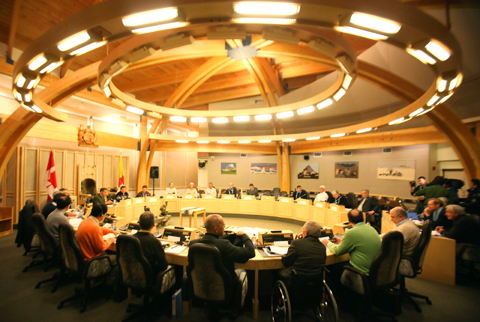Reassurances about debt-strapped Greece and an agreement that banks should pay for future rescue funds capped an international meeting in Canada’s Arctic as European policymakers sought to convince jittery markets that they have things under control.
Ministers and central bank governors said economies were recovering from recession, but stuck to their view that it was too early to withdraw government help.
In a statement issued on Saturday after two days of G7 talks, European Central Bank President Jean-Claude Trichet said he believed Greece would meet tough targets to lower its budget gap.

PHOTO: AP
“We expect and we are confident that the Greek government will [make] all the decisions that will permit it to reach that goal,” Trichet said.
French Finance Minister Christine Lagarde said euro zone countries would make sure the Greek plan was implemented and Jean-Claude Juncker, chairman of the group of euro zone finance ministers, dismissed the idea Greece would need money from the IMF.
World stock markets slumped to three-month lows on Friday on fears that Greece’s crisis would spread and the euro fell to its lowest level against the US dollar in eight-and-a-half months.
Earlier, officials from the G7 — comprising Britain, Canada, France, Germany, Italy, Japan and the US — said support was rising for a levy on banks that could pay for global governments’ rescue of the financial system, but such a levy would have to be designed so it did not derail a tentative economic recovery, they said.
US Treasury Secretary Timothy Geithner played down differences between countries on banking reform.
Last month the administration of US President Barack Obama stunned the banking industry with tough reform proposals that took other countries by surprise too.
“We all share a deep commitment to try to move forward and reach agreement on a strong, comprehensive set of financial reforms on the timetable we all committed to last September,” he said. “That means agreement on ... a new set of capital requirements for large global institutions by the end of this year.”
Iqaluit, the town that hosted the meeting, was the most exotic location for a G7 meeting to date, offering food that included Arctic char and muskox minestrone. A shortage of commercial flights and the distances involved meant most ministers used government jets.
Geithner said that the G7 underscored its commitment to reinforcing recovery, while Canada’s Jim Flaherty said the global economy was improving but still needed government help.
“We do not have a firmly established recovery yet, but there are signs,” he said.
The US and other big economies are also saddled with debts, having spent heavily to stave off a depression.
Ratings agency Moody’s Investors Service this week said the US must do more to keep its AAA rating after the Obama administration said it expected a deficit equivalent to 10.6 percent of GDP this year, more than three times the level considered sustainable by economists.

The CIA has a message for Chinese government officials worried about their place in Chinese President Xi Jinping’s (習近平) government: Come work with us. The agency released two Mandarin-language videos on social media on Thursday inviting disgruntled officials to contact the CIA. The recruitment videos posted on YouTube and X racked up more than 5 million views combined in their first day. The outreach comes as CIA Director John Ratcliffe has vowed to boost the agency’s use of intelligence from human sources and its focus on China, which has recently targeted US officials with its own espionage operations. The videos are “aimed at

STEADFAST FRIEND: The bills encourage increased Taiwan-US engagement and address China’s distortion of UN Resolution 2758 to isolate Taiwan internationally The Presidential Office yesterday thanked the US House of Representatives for unanimously passing two Taiwan-related bills highlighting its solid support for Taiwan’s democracy and global participation, and for deepening bilateral relations. One of the bills, the Taiwan Assurance Implementation Act, requires the US Department of State to periodically review its guidelines for engagement with Taiwan, and report to the US Congress on the guidelines and plans to lift self-imposed limitations on US-Taiwan engagement. The other bill is the Taiwan International Solidarity Act, which clarifies that UN Resolution 2758 does not address the issue of the representation of Taiwan or its people in

US Indo-Pacific Commander Admiral Samuel Paparo on Friday expressed concern over the rate at which China is diversifying its military exercises, the Financial Times (FT) reported on Saturday. “The rates of change on the depth and breadth of their exercises is the one non-linear effect that I’ve seen in the last year that wakes me up at night or keeps me up at night,” Paparo was quoted by FT as saying while attending the annual Sedona Forum at the McCain Institute in Arizona. Paparo also expressed concern over the speed with which China was expanding its military. While the US

SHIFT: Taiwan’s better-than-expected first-quarter GDP and signs of weakness in the US have driven global capital back to emerging markets, the central bank head said The central bank yesterday blamed market speculation for the steep rise in the local currency, and urged exporters and financial institutions to stay calm and stop panic sell-offs to avoid hurting their own profitability. The nation’s top monetary policymaker said that it would step in, if necessary, to maintain order and stability in the foreign exchange market. The remarks came as the NT dollar yesterday closed up NT$0.919 to NT$30.145 against the US dollar in Taipei trading, after rising as high as NT$29.59 in intraday trading. The local currency has surged 5.85 percent against the greenback over the past two sessions, central